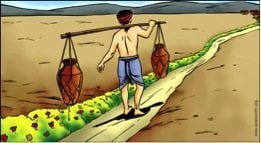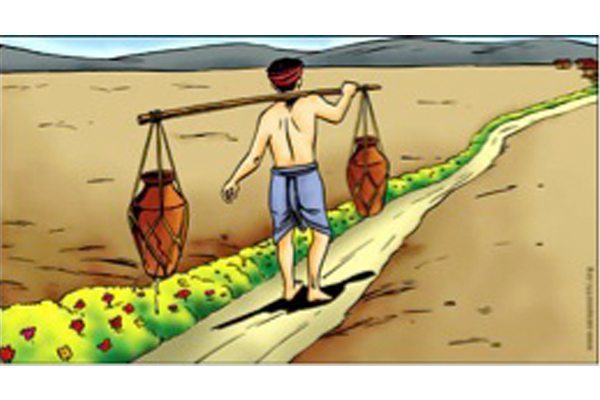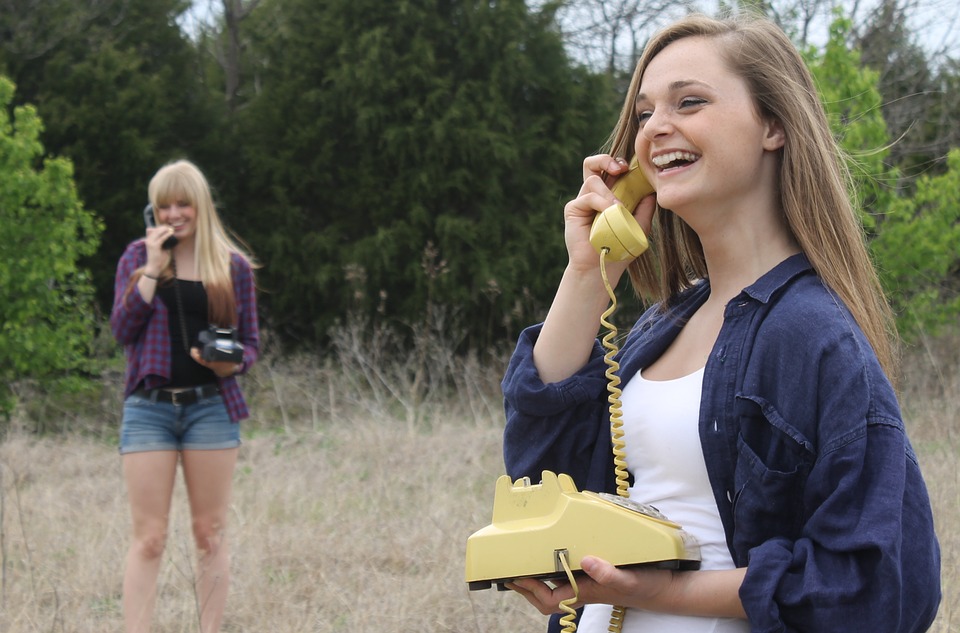We fall in love with stories as small children – and never really outgrow it. Hence, one of the most effective ways of engaging participants in a workshop is by the effective use of stories. Here are a couple of stories that you may use with your teams!
The Cracked Pot
A water bearer had two large pots, one hung on each end of a pole, which he carried across his neck. One of the pots had a crack in it. While the other pot was perfect, and always delivered a full portion of water at the end of the long walk from the stream to the mistress’s house, the cracked pot arrived only half full.

The perfect pot was proud of its accomplishments, perfect to the end for which it was made. But the poor cracked pot was ashamed of its own imperfection, and miserable that it was able to accomplish only half of what it had been made to do.
After two years of what it perceived to be a bitter failure, it spoke to the water bearer one day by the stream: “I am ashamed of myself, and I want to apologize to you.”
Why?” asked the bearer. “What are you ashamed of?”
“I have been able, for these past two years, to deliver only half my load because this crack in my side causes water to leak out all the way back to your mistress’s house. Because of my flaws, you have to do all of this work, and you don’t get full value from your efforts,” the pot said. The water bearer felt sorry for the old cracked pot, and in his compassion he said, “As we return to the mistress’s house, I want you to notice the beautiful flowers along the path.” Indeed, as they went up the hill, the old cracked pot took notice of the sun warming the beautiful wild flowers on the side of the path, and this cheered it some. But at the end of the trail, it still felt bad because it had leaked out half its load, and so again it apologized to the bearer for its failure. The bearer said to the pot, “Did you notice that there were flowers only on your side of the path, but not on the other pot’s side?
“That’s because I have always known about your flaw, and I took advantage of it. I planted flower seeds on your side of the path, and every day while we walk back from the stream, you’ve watered them. “For two years I have been able to pick these beautiful flowers to decorate my mistress’s table. Without you being just the way you are, she would not have this beauty to grace her house.”
Moral: Each of us has our own unique flaws. We’re all cracked pots. But it’s the cracks and flaws we each have that make our lives together so very interesting and rewarding. We’ve just got to take each person for what they are, and look for the good in them. There’s a lot of good out there.
From a team’s perspective it is indispensable for the team to value each individual. Every team member needs to understand the weakness and respect the strength of other. That makes a team to perform together, irrespective of its differences.
Fable of the Porcupine
It was the coldest winter ever. – Many animals died because of the cold. The porcupines, realizing the situation, decided to group together. This way they covered and protected themselves; but the quills of each one wounded their closest companions even though they gave off heat to each other. After awhile, they decided to distance themselves one from the other and they began to die, alone and frozen. So they had to make a choice: either accept the quills of their companions or disappear from the Earth. Wisely, they decided to go back to being together. This way they learned to live with the little wounds that were caused by the close relationship with their companion, but the most important part of it, was the heat that came from the others. This way they were able to survive.
The best relationship is not the one that brings together perfect people but one where each person learns to live with the imperfections of others and can admire the other person’s good qualities
If we start to love the pricks in our life, working with anybody in any team will be possible.
Masters of our mouths
Once upon a time an old man spread rumors that his neighbor was a thief. As a result, the young man was arrested. Days later the young man was proven innocent. After been released he sued the old man for wrongly accusing him. In court the old man told the Judge: ‘They were just comments, they didn’t harm anyone..’
The judge, before passing sentence on the case, told the old man: ‘write all the things you said about him on a piece of paper. Cut them up and on the way home, throw the pieces of paper out. Tomorrow, come back to hear the sentence.’
The next day, the judge told the old man: ‘Before receiving the sentence, you will have to go out and gather all the pieces of paper that you threw out yesterday.’ The old man said: ‘I can’t do that! The wind spread them and I won’t know where to find them.’
The judge then replied: ‘the same way, simple comments may destroy the honor of a man to such an extent that one is not able to fix it. If you can’t speak well of someone, rather don’t say anything. ‘Let’s all be masters of our mouths, so that we won’t be slaves of our words.’
Sometimes in office we don’t realize that what we are saying about others can do irreversible damage to their reputation and this forms cracks in the team.
The Salt Merchant and the Donkey
A Salt Merchant drove his Donkey to the seashore to buy salt. His road home lay across a stream into which his Donkey tripped and fell by accident. When the Donkey got out of the water, his load considerably lighter, as the water melted the salt in the sack.
The Merchant went back to the market by the seashore and refilled his bags with a larger quantity of salt than before. When he came again to the stream, the Donkey fell down on purpose in the same spot, and, regaining his feet with the weight of his load much diminished, brayed triumphantly as if he had obtained what he desired.
The Merchant saw through this trick and drove the Donkey for the third time to the coast, where he bought a cargo of sponges instead of salt. The Donkey, again playing the fool, fell down on purpose when he reached the stream, but the sponges became swollen with water, greatly increasing his load. Thus his trick recoiled on him, for he now carried on his back a double burden.
Sometimes we get across a trick of an easier way of doing a job. It may work for some days, but we never know when it falls flat. Don’t try a trick too often or it will turn against you.
We have seen these stories to start very fruitful conversations in a team facilitation environment. Do share if you know any more such stories, which can be shared with teams.



